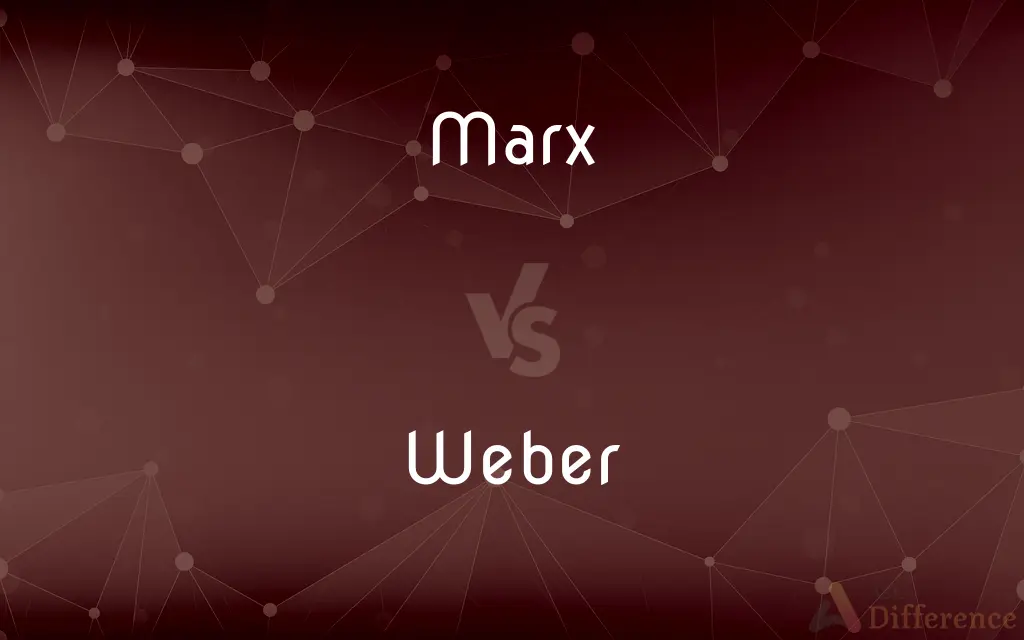Marx vs. Weber — What's the Difference?
Edited by Tayyaba Rehman — By Fiza Rafique — Published on October 1, 2023
Marx and Weber are both influential sociologists; Marx emphasized economic class struggle, while Weber focused on the interplay of ideas, power, and class.

Difference Between Marx and Weber
Table of Contents
ADVERTISEMENT
Key Differences
Marx, a 19th-century philosopher and economist, posited a historical materialist view where societal change arises from class conflicts. Weber, on the other hand, was a sociologist who emphasized the role of ideas, particularly religion, and the bureaucratic nature of modern society.
Marx's theory of historical materialism argued that society's structure and change are driven by economic forces and class relations. Weber, however, saw the rise of modern capitalism as linked with Protestant ethics and believed that societal structures were influenced by various factors beyond just economics.
Marx believed that a proletariat revolution would lead to communism—a classless society. Weber, conversely, thought modern society would be characterized by increasing rationalization and bureaucracy, rather than a classless utopia.
In summary, while Marx's theories revolve around economic determinism and class struggle, Weber's work emphasizes the importance of ideas, beliefs, and organizational structures.
Comparison Chart
Focus
Economic class struggle
Interplay of ideas, power, & class
ADVERTISEMENT
Views on Capitalism
Result of material conditions
Linked with Protestant ethics
Predicted Outcome
Classless society (communism)
Continued rationalization & bureaucracy
Primary Methodology
Historical materialism
Verstehen (interpretive understanding)
Relation to Religion
Religion as "opium of the people"
Religion as a force shaping capitalism
Compare with Definitions
Marx
A 19th-century philosopher and economist.
The theories of Marx have influenced numerous political movements.
Weber
Analyst of the connection between Protestant ethics and capitalism.
Weber's The Protestant Ethic and the Spirit of Capitalism is a landmark study.
Marx
Critic of capitalism, advocating for communism.
Marx believed that the proletariat would overthrow the bourgeoisie.
Weber
Theorist who examined rationalization in society.
Weber feared the iron cage of rationalization.
Marx
Proponent of historical materialism.
Marx argued that economic factors drive societal change.
Weber
Term referencing Weberian theory or principles.
Many sociological theories are influenced by Weber's ideas.
Marx
Co-author of the "Communist Manifesto."
Marx, along with Engels, outlined their beliefs in this seminal work.
Weber
German sociologist known for his study of modern bureaucracy.
Weber's analysis of authority is foundational in sociology.
Marx
United States comedian; one of four brothers who made motion pictures together (1901-1979)
Weber
Proponent of "Verstehen" or interpretive understanding.
Weber emphasized a deep understanding of individual actions.
Marx
United States comedian; one of four brothers who made motion pictures together (1893-1964)
Weber
Weber (, or ; German: [ˈveːbɐ]) is a surname of German origin, derived from the noun meaning "weaver". In some cases, following migration to English-speaking countries, it has been anglicised to the English surname 'Webber' or even 'Weaver'.
Marx
United States comedian; one of four brothers who made motion pictures together (1891-1961)
Weber
The SI-derived unit of magnetic flux, equal to the flux that produces an electromotive force of one volt in a conducting loop when the flux is uniformly reduced to zero within one second. See Table at measurement.
Marx
United States comedian; oldest of four brothers who made motion pictures together (1890-1977)
Weber
In the International System of Units, the derived unit of magnetic flux; the flux linking a circuit of one turn that produces an electromotive force of one volt when reduced uniformly to zero in one second. Symbol: Wb.
Marx
Founder of modern communism; wrote the Communist Manifesto with Engels in 1848; wrote Das Kapital in 1867 (1818-1883)
Weber
The standard unit of electrical quantity, and also of current. See Coulomb, and Amp re.
Marx
Term referencing Marxian theory or principles.
Many leftist movements are rooted in Marx's ideas.
Weber
A unit of magnetic flux equal to 100,000,000 maxwells
Weber
German physicist and brother of E. H. Weber; noted for his studies of terrestrial magnetism (1804-1891)
Weber
United States abstract painter (born in Russia) (1881-1961)
Weber
German sociologist and pioneer of the analytic method in sociology (1864-1920)
Weber
German conductor and composer of Romantic operas (1786-1826)
Weber
German physiologist who studied sensory responses to stimuli and is considered the father of psychophysics (1795-1878)
Common Curiosities
What did Marx believe about capitalism's future?
Marx believed capitalism would be overthrown by the proletariat, leading to communism.
Who was Weber?
Weber was a German sociologist who studied bureaucracy, authority, and the link between religion and capitalism.
Who was Marx?
Marx was a 19th-century philosopher and economist known for his theories on class struggle and communism.
What did Marx think about religion?
Marx considered religion to be the "opium of the people," a tool of oppression.
How did Weber view religion?
Weber saw religion, particularly Protestantism, as a significant factor in the rise of modern capitalism.
What does "Verstehen" mean in Weber's work?
"Verstehen" refers to an interpretive understanding of individual actions in their social context.
What is historical materialism in Marx's theory?
It's Marx's idea that material conditions, especially economic factors, drive societal change.
Did Weber agree with all of Marx's ideas?
No, Weber critiqued and expanded on many of Marx's concepts, offering alternative interpretations.
How did Weber see modern society developing?
Weber thought modern society would be characterized by increasing rationalization and bureaucracy.
How do Marx and Weber differ in their views on class?
While both recognized class divisions, Marx emphasized economic class struggle, whereas Weber saw class interplaying with status and power.
What's Marx's "Communist Manifesto" about?
Co-written with Engels, it outlines the principles of communism and critiques capitalism.
Share Your Discovery

Previous Comparison
Beachfront vs. Oceanfront
Next Comparison
Trade Discount vs. Cash DiscountAuthor Spotlight
Written by
Fiza RafiqueFiza Rafique is a skilled content writer at AskDifference.com, where she meticulously refines and enhances written pieces. Drawing from her vast editorial expertise, Fiza ensures clarity, accuracy, and precision in every article. Passionate about language, she continually seeks to elevate the quality of content for readers worldwide.
Edited by
Tayyaba RehmanTayyaba Rehman is a distinguished writer, currently serving as a primary contributor to askdifference.com. As a researcher in semantics and etymology, Tayyaba's passion for the complexity of languages and their distinctions has found a perfect home on the platform. Tayyaba delves into the intricacies of language, distinguishing between commonly confused words and phrases, thereby providing clarity for readers worldwide.
















































